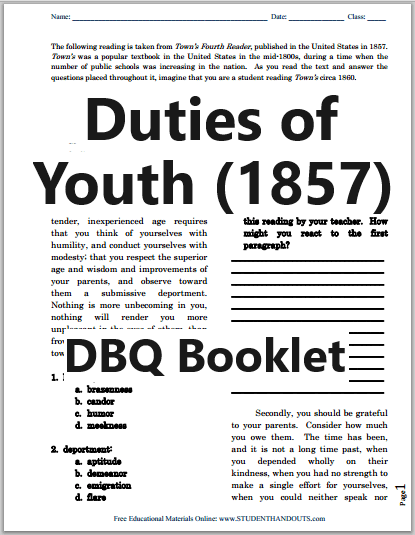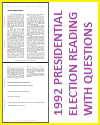| Duties of Youth (1857) DBQ Booklet |
|---|
| studenthandouts.com ↣ U.S. History ↣ Westward Expansion ↣ Westward Expansion Worksheets |
 The following reading is taken from Town’s Fourth Reader, published in the United States in 1857. Town’s was a popular textbook in the United States in the mid-1800s, during a time when the number of public schools was increasing in the nation. As you read the text and answer the questions placed throughout it, imagine that you are a student reading Town’s circa 1860.
The following reading is taken from Town’s Fourth Reader, published in the United States in 1857. Town’s was a popular textbook in the United States in the mid-1800s, during a time when the number of public schools was increasing in the nation. As you read the text and answer the questions placed throughout it, imagine that you are a student reading Town’s circa 1860.Duties of Youth by Channing First, you are required to view and treat your parents with respect. Your tender, inexperienced age requires that you think of yourselves with humility, and conduct yourselves with modesty; that you respect the superior age and wisdom and improvements of your parents, and observe toward them a submissive deportment. Nothing is more unbecoming in you, nothing will render you more unpleasant in the eyes of others, than froward or contemptuous conduct towards your parents. 1. humility: a. brazenness b. candor c. humor d. meekness 2. deportment: a. aptitude b. demeanor c. emigration d. flare 3. Imagine that you are a student, circa 1860, and have been assigned this reading by your teacher. How might you react to the first paragraph? Secondly, you should be grateful to your parents. Consider how much you owe them. The time has been, and it is not a long time past, when you depended wholly on their kindness, when you had no strength to make a single effort for yourselves, when you could neither speak nor walk, and knew not the use of any of your powers. Had not a parent’s arm supported you, you must have fallen to the earth and perished. Observe with attention the infants which you so often see, and consider that, a little while ago, you were as feeble as they are; you were only a burden and a care, and you had nothing with which you could repay your parents’ affection. 4. wholly: a. entirely b. hairy c. glutinous d. more or less 5. perished: a. candidly described b. entirely submissive c. overtly displayed d. violently destroyed 6. feeble: a. frail b. incompetent c. narcissistic d. vain But did they forsake you? How many sleepless nights have they been disturbed by your cries! When you were sick, how tenderly did they hang over you! With what pleasure have they seen you grow up in health to your present state! And what do you now possess which you have not received at their hands? God, indeed, is your great parent, your best friend, and from Him every good gift descends; but God is pleased to bestow everything upon you, through the kindness of your parents. To your parents you owe every comfort; you owe to them the shelter you enjoy from the rain and cold, the raiment which covers, and the food which nourishes you... While you are seeking amusement, or are employed in gaining knowledge at school, your parents are toiling that you may be happy, that your wants may be supplied, that your mind may be improved, that you may grow up and be useful in the world. And when you consider how often you have forfeited all this kindness, and yet how ready they have been to forgive you, and to continue their favors, ought you not to look upon them with the tenderest gratitude? What greater monster can there be than an unthankful child, whose heart is never warmed and melted by the daily expressions of parental solicitude; who, instead of requiting his best friends by his affectionate conduct, is sullen and passionate, and thinks that his parents have done nothing for him, because they will not do all he desires? My young friends, your parents’ hearts have ached enough for you already; you should strive from this time, by your expressions of gratitude and love, to requite their goodness. Do you ask how you may best express these feelings of respect and gratitude which have been enjoined? In answer, I would observe... Click here to print. There are nine pages total (five double-sided sheets) including the complete text and an assortment of questions (vocabulary, recall, comprehension, analysis). Click here for the answer key. |
 |  |  |  |  |
| studenthandouts.com ↣ U.S. History ↣ Westward Expansion ↣ Westward Expansion Worksheets |








